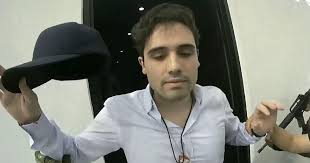In a development that could have far-reaching implications for the infamous Sinaloa cartel, one of Joaquín “El Chapo” Guzmán’s sons, Ovidio Guzman López, has entered into plea negotiations with federal prosecutors in Chicago. Guzman, also known as “the Mouse,” is facing serious narcotics trafficking charges, which are part of a broader crackdown on the cartel’s activities involving synthetic drugs like methamphetamine and fentanyl.
The negotiations mark a significant turn in the legal battle against the cartel, as U.S. authorities have long sought to dismantle the drug empire that El Chapo built. Following his arrest and subsequent life sentence in the U.S., his sons, known collectively as “Los Chapitos,” have been accused of taking control of cartel operations, leading it further into the production and distribution of powerful synthetic drugs.
The discussions over a potential plea deal were confirmed during a recent status hearing in a Chicago district court. Guzman López appeared in court, acknowledging that attorney Jeffrey Lichtman would represent him and his brother, Joaquín. Lichtman, who previously defended their father, assured the court there would be no conflict of interest in his dual representation.
“Two different cases,” Lichtman said. “Although I represent both brothers, it doesn’t change the fact that they individually have their case. This isn’t a package deal.” Lichtman also emphasized that while he represents both Ovidio and Joaquín, the government sees their cases differently, hinting at separate legal strategies for each.
Ovidio Guzman was arrested by Mexican security forces in January 2023 in Culiacán, the capital of Sinaloa state, following a tense operation that marked a significant victory for law enforcement. His brother Joaquín was detained months later in July. Both brothers are now facing charges in the U.S. for their alleged roles in trafficking methamphetamine and fentanyl across the border, with Ovidio’s case being handled in Chicago while Joaquín awaits proceedings in New York.
The U.S. crackdown on Los Chapitos became even more evident in April 2023, when prosecutors unsealed indictments against the brothers. The charges laid bare the extent of their alleged activities in the drug trade, accusing them of taking over the Sinaloa cartel after El Chapo’s extradition and life sentence and steering it deeper into synthetic drug trafficking.
While a plea deal suggests that Ovidio might be willing to accept some level of responsibility for the charges against him, Lichtman was quick to assert that there are no current discussions about cooperating with prosecutors. “And there’s a possibility that I could wake up tomorrow morning and be six-foot-11 and playing center for the Knicks,” Lichtman quipped, downplaying any speculation that the brothers might testify against their associates. “It doesn’t mean that it’s going to happen.”
Legal experts, however, note that entering plea negotiations often involves making some admissions of guilt. According to former federal prosecutor and ABC7 Legal Analyst Gil Soffer, plea deals can take many forms, but true cooperation—where a defendant provides information or testifies—typically results in more lenient sentencing.
“A plea deal, if it goes to an agreement, means that the defendant will be acknowledging guilt, standing in court, and entering a plea of guilty,” said Soffer. “They’ll be admitting to the charges brought against them.”
The Sinaloa cartel, once ruled unchallenged by El Chapo, has been under intense scrutiny since his arrest. Now, with Ovidio and Joaquín in U.S. custody, authorities are looking to further weaken the organization. The arrest of another cartel figure, Ismael “El Mayo” Zambada, in July adds to the growing list of legal challenges facing the group. Zambada is being held in New York, where he will face trial, and any testimony from Los Chapitos could be a significant blow to his defense.
Authorities have highlighted how the Sinaloa cartel’s shift to synthetic drugs, particularly fentanyl, has been driven by market demand and lower production costs. The deadly opioid has contributed to a significant rise in overdose deaths in the U.S., prompting aggressive law enforcement actions against its suppliers.
Ovidio Guzman’s plea negotiations could have far-reaching consequences for both the Sinaloa cartel and law enforcement efforts to combat the opioid crisis. As the case develops, legal observers will be watching to see if negotiations lead to a guilty plea, a trial, or even cooperation with authorities.
For now, what’s clear is that the U.S. government is determined to use every available legal avenue to hold cartel leaders accountable, and the negotiations with Guzman López represent a critical piece of that effort. If the plea deal goes forward, it could mark a turning point in the battle against one of the most powerful drug organizations in the world.
Whether these legal maneuvers will significantly disrupt the cartel’s operations remains to be seen, but the case against Ovidio Guzman continues to draw significant attention as authorities work to curtail the spread of synthetic drugs and dismantle the networks responsible for their distribution.
